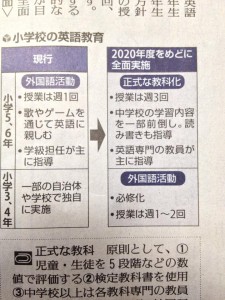Elementary School English (MEXT announcement)
Some big news from MEXT this week (courtesy of Kensaku Yoshida on Facebook)
Basically, from 2020 (estimated), 5-6 grade students will have English as a subject three times a week with specialist teachers. 3-4 grade students will have English activities once or twice a week.
The devil is in the details (see my recommendations here) but this looks like a step in the right direction!
curriculum expectations language courses materials presentations publishing textbooks university
by sendaiben
leave a comment
Creating new teaching material
This semester I am working on a new presentation textbook for my classes here at Tohoku University (okay, so I am also hoping I will be able to sell it to a publisher eventually too), and thought it might be interesting to write a little about how that is turning out. Experienced material developers probably won’t get much out of this, but if you are just starting out like I am, or have yet to start, you might find something useful.
My desk at work. Note the all-important coffee cup and blank notebook -I find it really helpful to explore ideas on paper before starting work on the computer.
For my presentation course, I was provided with some fairly rigid constraints: too many students (one class of 32 and one of 25), too few classes (maximum of 14, more like 13 once the first one is used up for orientation), and a not-quite perfect classroom (it’s a little too small for group work). However, this is actually helpful, as it provides space in which to work. Having complete free reign paralyses me.
My project is very much a work in progress at the moment, but here are the major steps so far:
- determine the goals of the course
- decide on topics to include, and the order to teach them in
- establish a class routine
- figure out what materials to create for each class
- write the materials
- scribble over the materials in red pen after class with corrections and ideas
I have realised those four elements in bold are the foundation of a class, and getting them straight is probably 90% of the work. Now that they are done, and in great contrast to previous courses I have designed, it’s pretty easy to sit down each week and plan my classes.
Right now I am mainly trying to get the content and the activities right, and not worrying too much about design.
Has anyone successfully completed a project like this? Am I missing anything?
business curriculum expectations reviews school management teaching
by sendaiben
leave a comment
Work the System – book review
(I reviewed this book previously on my book reviews blog, but am re-posting here as I think it might be helpful to readers)
Work the System, by Sam Carpenter, is a book with a very simple premise: it is possible to vastly improve your work and your life by concentrating on systems.
In a similar vein to Tim Ferriss, Carpenter emphasizes the gains to be made when everyday tasks are optimized and automated. He advocates writing down step-by-step instructions for any task that has to be performed regularly.
The premise is obvious, but after just one reading I have identified dozens of areas in my own life where I can apply this. The upside seems enormous.
For teachers, this would involve writing a class manual for your students that describes all the tasks they must perform. At Tohoku University, thanks to the mad organizational skills of my colleague Dan E., we already have something like this, and it makes teaching almost effortless.
Essential to entrepreneurs and small-business owners, this book should also prove useful for classroom teachers. Extremely recommended, unless you are already a happy productivity ninja with a great life 🙂
conference expectations extensive reading Korea personal
by sendaiben
7 comments
English in Korea
I was in Seoul last weekend for the 2nd Extensive Reading World Congress (video of our workshop coming soon).
Seoul is a great city, and I get the feeling I would become very fond of it if I lived there and got to know it well.
This time though, I was very surprised at the general lack of English. My impression of Korea is that it is a country that is really emphasizing practical English skills. I have visited a couple of leading universities in Seoul in the past and was very impressed with their curricula.
However, walking around the city, I found that very few people seem to speak English outside of hotels and the airport. Everyone was very friendly and I didn’t have any problems that couldn’t be solved with a smile, some sign language, and a ‘kam sa ham ni da’, but the lack of English proficiency surprised me.
Does anyone have more extensive experience of Korea? Is my impression accurate?
What do I desire?
I had an interesting thought the other day: I have decided to assume that I will only live to 50. I’m now 36, so that gives me another 14 years. In that seemingly short time I need to accomplish everything that I want to do because I won’t have the chance to do it otherwise.
Why 50? It just seems like a nice round number. Also, both my parents died in their 40s, so I may well have a genetic time-bomb ticking inside me. In fact, 50 might be a bit too optimistic. I could also live past 100, but I am assuming that having reached 50 and accomplished all the important things I want to do, any extra time is just gravy.
In almost any endeavor, setting limits helps define what needs to be done and helps people get started. If you only have 200 words to write it’s much easier than if you have 80,000. It’s easier to be given a topic than told to write about anything.
So what do I want to do? I haven’t quite decided yet. There is a lot of travel in there, some writing, and spending time with my family. There is a lot less Facebook checking and random web surfing.
What would you do if you had less than 15 years left?



